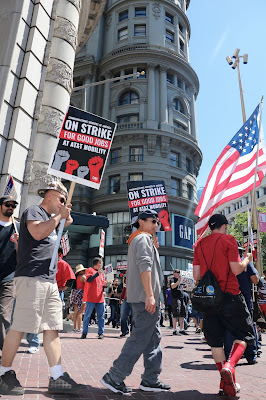AT&T Workers Strike Across the Country
On Friday, 40,000 AT&T workers in phone sales (mobility) and landline and cable installation went on strike across 36 states. In California and Nevada, workers (unionized with the CWA) have been on the job without a contract for over a year. The company's CEO, Randal Stephenson, was recently given a raise and now makes over $12,000 an hour. Meanwhile, mobility workers are being offered a 40 cent wage increase that means nothing in the face of increasing living costs, especially in the Bay Area. In addition, the company wants to relocated call center jobs to Mexico, the Philippines, the Dominican Republic, increase the amount workers pay for health insurance, cut sick time, and increase a highly punitive points based penalty system in which workers would face disciplinary actions after using a fourth sick days.
Journalist David Bacon reports that "AT&T is the largest telecommunications company in the country with $164 billion in sales and 135 million wireless customers nationwide. It has eliminated 12,000 call center jobs in the United States since 2011, representing more than 30 percent of its call center employees, and closed more than 30 call centers. Meanwhile, the company has outsourced the operation of more than 60 percent of its wireless retail stores to operators who pay much less than the union wage, according to CWA."
In San Francisco, CWA AT&T workers were joined by fellow union members from other lines of work to picket the company's flagship store at 1 Powell St.
Two cable installation workers described work conditions and shared thoughts on the strike. One said the 40 cent proposed wage increase meant nothing in the face of high living expenses in the Bay Area. When he complained, he was told to move someplace less expensive or work longer hours. Another described the points based discipline system, in which workers can afford to lose four points before getting in trouble. Points can be lost for being a few minutes late to work or returning late from brake, and taking sick days. In a likely scenario, a worker who missed four workdays due to a family emergency would face discipline. In the past, retail workers have lost points for leaning on counters on the job after hours of standing.
Both were frustrated that other work sectors had settled on contracts before mobility workers had been offered a good contract. If the CWA had refused agreements until all workers' demands were met, strikers in SF and Nevada would have been strengthened immensely. Instead the CWA, whose leadership is not interested in a strike longer than 72 hours, chose to dived - and thereby weaken - the rank and file by settling in some areas before others were closed.
All but two store in SF were closed for the strike, yet the picket line was small. One store remained open because to close would violate its mall contract agreement. The flagship store at 1 Powell stayed open because scabs were flown in from Alabama and put up in nearby hotels. The two workers I spoke with did not expect the strike to be extended past 72 hours. A protracted dispute would drain the strike fund, thereby decreasing the pool from which union staffers and leaders draw their lucrative salaries. Some workers expressed frustration that the strike would not last past three days.



Comments
Post a Comment